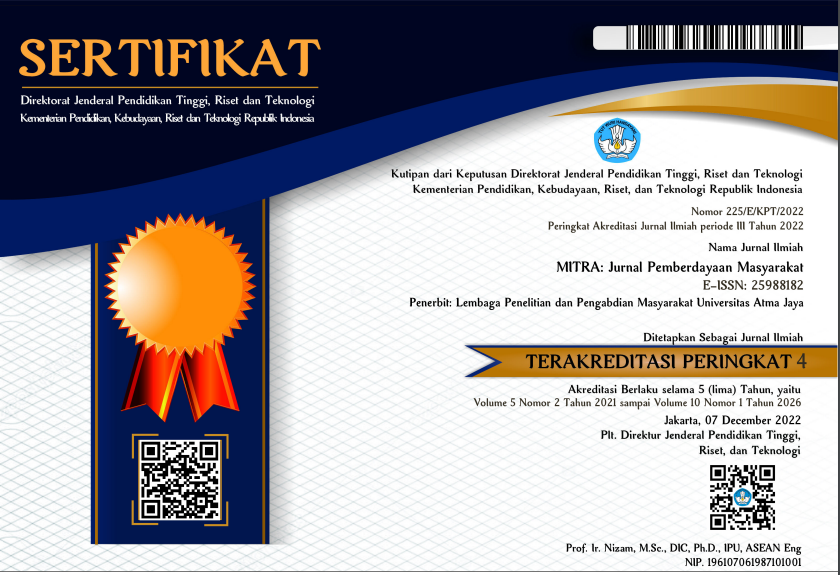Community Empowerment by Increasing The Hygiene and Competitive Production of Balobo Salted Fish
DOI:
https://doi.org/10.25170/mitra.v3i2.895Keywords:
Balobo Fish, Competitive, HygieneAbstract
Maluku Province is the national source of a fishery, the overload production urges society to use the fish salting method because it is unable to absorb by the market. One of the process results is Balobo fish from Aru Island which is tasteful and delicious, but there is no Halal Certification and Food Production Certificate - Household industry made low sales, with traditional production methods that not yet utilize technology furthermore results in low quality and quantity. Because of that, the purpose of community empowerment is to increase the hygiene and competitive production of balobo salted fish. The purpose of these activities is to increase the economy of the society whose acts as the producer of balobo salted fish, and to execute the program of the Ministry of Research, Technology, and Higher Education. The used method is design thinking, socialization, production equipment training, reduce the water content in salted fish to long-lasting, and check the nutrient content. The objectives of the activities are mindset alteration of society from conventional production to technology, hygiene production process, halal certification from Majelis Ulama Indonesia, has the nutrient content information and the enhancement of product endurance by reducing the water content in the product. The conclusion is Maluku has a huge fishery potential, one of which is salted fish, by changing the mindset and technology furthermore it can increase the society's standard of living. The proposal is monetary aid for the capital and complex machinery to accelerate the production and sales process.
Keywords: Balobo Fish, Competitive, Hygiene
References
Biro Pusat Statistik Maluku. (2017). Laporan badan pusat statistik Maluku. Ambon: BPS.
Direktorat Inovasi dan Inkubator Bisnis. (2016). Design thinking. https://diib.ui.ac.id › wp-content › uploads › 2016/08 › Design-Thinking2. Diakses 7 Agustus 2019.
https://maluku.bps.go.id/publication/2019/08/16/1491fd5b45fa85a8a94b79b7/ provinsi-maluku-dalam-angka-2019.html. Diakses 7 Agustus 2019.
Humas DJPT. (2018). Pelabuhan Perikanan Dobo Kepulauan Aru dijadikan sentra lumbung ikan nasional.
https://news.kkp.go.id/index.php/pelabuhan-perikanan-dobo-kepulauan-aru-dijadikan-sentra-lumbung-ikan-nasional-2. Diakses 5 Agustus 2019.
Kepulauan Aru. http://www.malukuprov.go.id/index.php/2016-10-06-01-23-21/2016-10-12-00-37-52. Diakses 5 Agustus 2019.
Kusnadi. (2007). Stategi Hidup Masyarakat Nelayan. Yogyakarta: LKiS.
Prasasty, V. D., Gunadi, M., & Vivin. (2018). Identifikasi pengetahuan higienitas dan sanitasi. Mitra: Jurnal Pemberdayaan Masyarakat, 2(2), 137--146.
Ubwarin, E. (2018). Penegakan hukum yang dilakukan oleh polair Polda Maluku. Jurnal Muara Ilmu Sosial, Humaniora, dan Seni, 2(1), 44--51.
Downloads
Published
Issue
Section
License
This license allows reusers to distribute, remix, adapt, and build upon the material in any medium or format for noncommercial purposes only, and only so long as attribution is given to the creator. If you remix, adapt, or build upon the material, you must license the modified material under identical terms.



_.jpeg)

.png)
2.png)
.png)
.png)



